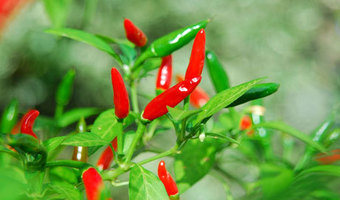 Farmers in Homabay District who have traditionally decried low yields due to poor soils have found solace in chilli farming now earning them over Sh1,000 a week in exports, ten times what they earned from maize thanks to a partnership with a chilli exporting company.
Farmers in Homabay District who have traditionally decried low yields due to poor soils have found solace in chilli farming now earning them over Sh1,000 a week in exports, ten times what they earned from maize thanks to a partnership with a chilli exporting company.
Magdaline Ajowi a farmer in Rangwe village of Homa Bay District had become accustomed to watching her barren one eighth acre piece of land harvest after harvest. Poor soils as a result of over use of fertilizers meant that the maximum she could get from her farm was a paltry two bags.
Her story reverberated across HomaBay district whereas hundreds of farmers succumbed to poor soils. After months of frustration a representative of Mace Foods, a company involved in horticultural exports predominantly chilli introduced them to the Bird’s Eye Chilli variety. This is the smallest type of chilly, which is about a centimetre long and red in colour when ripe. The crop has a ready market in the European Union.
After Mace Foods set shop in the area. Agronomist Nickson Agao was deployed to the region to buy the product, but realised that farmers were unable to produce the quantity required. Mr Agao says he further engaged the company to enable him train and convince farmers that the business was viable. Less than a year later, farmers in the region can afford a smile.
The crop only requires four months to mature from seed to fruit. It takes about a month at the nursery and once transplanted, it takes about three months to be harvested. "We usually solicit seed from supporters of this project on behalf of farmers as part of the programme to fight poverty in this region," said Mr Agao.
The success of the crop has opened doors to more buyers increasing the farmggate price. Mr Peter Ouma Muga, an employee of East African Growers, now buys seeds for farmers and distributes to them free of charge. He says this is part of the social responsibility of the company, which has given him some days off duty to assist communities in doing business agriculture as opposed to subsistence.
Magdaline now say they can now employ young men and women to help pick the crop, whose harvest is quite involving. Mr Agao says: "We ship the chilly to Amsterdam in before it is transported to Germany, our headquarters." A kilogramme of dry chilly sells at Sh100 and if a farmer delivers 10 kilogrammes a week, she earns Sh1,000 which is paid on the spot.
Last year alone, Mace Foods collected 14 tonnes of chilly from the region, despite the fact that the crop was introduced late in the year. By end of March this year, farmers had delivered six tonnes which they describe as impressive. The chilly is of high quality in the sense that its pong is high and its colour lively red, which sells fast in the EU market. No chemicals are used, and this makes Kenyan pepper stronger in the foreign market.
And how do the farmers handle diseases? They crush chilly and spray the plants to kill any parasites. Composite manure is used as opposed to chemical manure. The area around Lake Victoria is suitable for this type of chilly, and if all people embraced the crop, the region would be soon financially stable.
The high temperatures at the lake region makes the chilly dry without developing any aflatoxins, which would otherwise compromise its quality and make it dangerous for consumption.
The crop, if marketed and embraced by the community around Lake Victoria would take advantage of the current suspension from the EU market of Asian chilly. Kenya is rated second in quality chilly production in the EU market, according to Mr Agao, adding: "We need more farmers to join and capitalise on the readily available market".
Michael Otieno Okoth is an expert of nursery development and transplanting of the crop. He says a packet of seeds contain about 8,000, which translates to 8,000 trees that cover about an eighth of an acre. Although the crop is drought resistant, rainy season makes it sprout fast and bear fruits at a faster rate, says Mr Okoth.
The chairman of Ndiru Chilly Farmers, Mr Charles Odera says Mace Foods introduced the seeds in the area, paying half of the cost until well-wishers came in to assist pay for the seeds fully. "At the beginning, it was difficult to grow the crop, but now we are used to it. We can now employ young men and women to pick our crop," says Mr Odera.
He says farmers are now able to pay school fees for their children, build decent houses and buy themselves food. Mr Muga said he had distributed about 500 packets of seed to farmers. He says that a packet, once planted, would yield 4,000 kilogrammes, which would translate to Sh400,000.
"Talk about this region where the poverty index is very high and you realise that such a project will get us out of the woods," says Mr Muga. The chilly project has been adopted by the people of Kagan, Kochia and Gem, all in Rangwe Division.
The farmers, apart from chilly, have taken to growing pineapples, onions and bananas for commercial purposes. Mr Muga said the farmers would soon diversify their crops to growing ginger, chamomile (an ingredient for cooking tea believed to kill stress), water melon and butternut.
The project, although small, could help alleviate poverty in the region, taking into account the short maturation period and the farm input required to get instant money.
















Comments powered by CComment